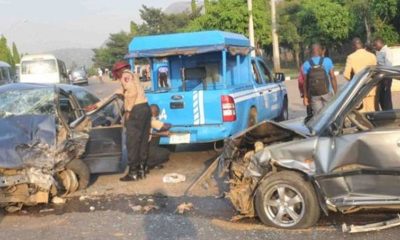metro
Fuel scarcity bites harder in Lagos, Ogun, Abuja, commuters stranded

Petrol scarcity worsened in different parts of Nigeria on Tuesday and motorists spent hours at filling stations in their battle to get the product.
Black marketers, according to a Punch report, had a field day, selling a litre of petrol between N300 and N400 in many parts of the country. And desperate motorists who could not afford to wait long hours at filling stations had to patronise them.
The situation has led to a sudden increase in transport fares across the country.
In Lagos, for instance, a trip from Iyana-Isolo to Berger along Lagos-Ibadan expressway that used to go for N500 jumped to N800 on Tuesday. The fare from Iyana Oworo to Berger was raised from N300 to N400, according to a Punch report.
Amid long queues and waiting hours in Lagos, some filling stations sold a litre of the Premium Motor Spirit at N200/litre as against the approved price of N180-N185/litre.
A Punch correspondent who visited some filling stations around Ikotun, Egbeda and Ojodu Berger areas reported long queues at the few stations that managed to sell.
A businessman, Kayode Oloriegbe, said he could not wait to buy from filling stations, but had to patronise a black marketer who sold at N300/litre.
“I was lucky to buy a 10-litre gallon at N3,500. Others said they bought at higher prices from the black marketers,” he said.
A tricyclist, Ade, who operates between Ago Palace Way and Second Rainbow Bus Stop at Amuwo-Odofin, said, “Black marketers sell five litres at N1,700 at Ago Palace during the day and N2500 at night. This is a normal thing. Whenever we are approaching the end of the year, we mostly witness fuel scarcity.”
READ ALSO:
- Bandits kill two, abduct 13 in Sokoto
- Missing 20-year-old lady who could not remember her details reunited with family
- Why I will support Tinubu – Rev. Dr. Sam Ogedengbe
One of our correspondents who went round the Isolo, Okota and Ilasa axis in Lagos witnessed that only one out of six petrol stations around that axis sold petrol to motorists and other consumers. Others said they did not have petrol.
Two NNPC filling stations before Sule Abore Street in Ojodu were shut.
The attendants at the filling stations told The Punch that they had run out of fuel. They, however, said they were expecting to get the supply before the end of yesterday (Tuesday).
At Bova’s filling station, a long queue caused traffic gridlock along Ogba road as of the time of filing this report.
Similarly, a long queue was sighted at Rainoil filling at Berger Roundabout, with some drivers alleging that they were charged an extra N300 by fuel attendants. The attendants declined to speak with our correspondent.
At the Eterna Oil filling station located before Afeez Bus Stop, Ojodu Berger, there was also a long queue.
One of the fuel attendants said the trucks that were supposed to supply them with fuel did not turn up.
A similar long queue was seen at the Amuf Oil filling station at the Grammar School Bus Stop, Ojodu Berger.
An attendant at Oando filling station, Aguda, after Omole Bus Stop, who spoke with The Punch, told one of our correspondents that the flood that occurred a few days ago caused fuel prices to shoot up at depots, making it difficult for many stations to sell at regulated prices.
Checks by one of our correspondents revealed that many of the petrol stations along Alagbole/Akute/Denro/Ajuwon axis were shut due to the unavailability of petrol, while some of the filling stations witnessed small crowds of motorists jostling to manoeuvre through the queues.
It was also observed that while some of the filling stations sold at N180/litre, others sold as high as N185 as motorists flooded forecourts of gas stations in search of petrol.
A motorist, who identified himself as Alabi, said he had tried to get the product from more than three different stations on Tuesday before retiring out of frustration.
“When I came back from work yesterday, I tried at least three different filling stations, all to no avail. None of them sold. This one is out of the blue. The country is just becoming frustrating. Here, they sell at N180. By the time you come tomorrow, they might sell at N190.”
READ ALSO:
- You are a nitwit and a misfit for the office you currently occupies, Tinubu reply Obaseki
- Nnamdi Kanu not targeted, Appeal Court Justifies transfer of 21 Justices
- 2023: Governor Ortom, Benue Elders Withdraw Support For Atiku
On the Iyana-Iba – Egbeda axis, only two filling stations (Oando and Total) were sold as at the time of this report while the gates of other stations, including the ones belonging to the Nigerian National Petroleum Company Limited (NNPCL), were under lock and key.
Other stations such as TotalEnergies, Ardova, 11 Plc and Fatgbems on the Berger expressway had long queues as of Tuesday morning.
Stations such as TotalEnergies and NNPCL sold at N180 per litre.
In Katsina State, operators of illegal fuel depots known as “Bubulutu” were the only ones that sold fuel to motorists and other users of the product.
The few filling stations that still sold the product, especially in the state capital, only sold for a few hours before announcing to motorists that the product was no longer available.
Although the majority of the black market operators sold at N2,000 per four-litre keg, they still recorded heavy patronage due to the non-availability of the product in many filling stations in the state.
Fuel scarcity was first observed at the beginning of October in the state and was attributed to the flooding witnessed along some of the routes which vehicles supplying fuel passed through.
The situation was still on as of Tuesday.
It was also observed that the few filling stations sold fuel to motorists N240 and N270 per litre.
Some motorists said the development had forced them to buy the products from neighbouring states where they alleged they found it easier to buy without much stress.
A lecturer at a University in Katsina said, “What I do these days before coming to Katsina is to fill up my car either in Kano or in Gusau and also buy an extra 25 litres to take care of my movements while here. I believe the fuel scarcity is more or less artificial, instead of all these flooding reasons being given as excuses.”
metro
Lakurawa terrorists kill 13 vigilantes in Kebbi

Lakurawa terrorists kill 13 vigilantes in Kebbi
The Lakurawa terrorist group on Sunday killed 13 members of a vigilante group as they attacked Morai community in Augie Local Government Area of Kebbi State.
The 13 vigilantes were reportedly killed when they tried to resist the Lakurawa as they attacked and rustled cattle from the community.
A local, Malam Ibrahim Augie, told our correspondent that vigilante members in their numbers had come out to repel the terrorists’ attack when they were informed of their incursion into the village, but the terrorists had already encircled them and killed 13 of them.
He said, “The vigilantes hid to attack and recapture the rustled cattle, but they didn’t know the Lakurawa had already seen them and they were shot and killed,” he said.
The police spokesman, CSP Nafiu Abubakar, could not be reached at the time of filing this report as his line was not going through.
Lakurawa terrorists kill 13 vigilantes in Kebbi
metro
Reno Omokri, Shehu Sani, others screened for ambassadorial appointments

Reno Omokri, Shehu Sani, others screened for ambassadorial appointments
Former Kaduna Central Senator Shehu Sani was among those screened by the Federal Government following the commencement of the screening process for candidates nominated for diplomatic roles in a bid to fill the vacant roles for its 76 embassies and 22 high commissions.
According to reports, nominees have been asked to report to the DSS offices nearest to them for security checks.
Some have reportedly been informed to provide personal education and work history.
It was gathered from a source that two former south-eastern governors, Ifeanyi Ugwuanyi and Okezie Ikpeazu, have been screened for the role.
READ ALSO:
- Nigerien Army arrests commander of terrorist group, seizes cash, weapons
- We’ll use robotic machines for underwear bridge inspection – Minister
- Dangote, Elumelu release private jets to fix Lagos traffic
The source also disclosed that Sani, who recently joined the ruling All Progressives Congress (APC), and former presidential aide Reno Omokri are among the nominees who have also been screened.
The source also revealed that former Deputy Governor of Lagos State, Femi Pedro, and former Minister of Aviation, Femi Fani-Kayode, have already gone through the screening process and have been cleared for their prospective national assignments.
In September 2023, President Bola Tinubu recalled all Nigerian diplomats, both career and non-career.
Nearly two years after their recall, in March 2025, the presidency stated that their replacements would be named “very soon”.
Reno Omokri, Shehu Sani, others screened for ambassadorial appointments
metro
Nigerien Army arrests commander of terrorist group, seizes cash, weapons

Nigerien Army arrests commander of terrorist group, seizes cash, weapons
The Nigerien Army has arrested a suspected senior member of the terrorist group Jama’at Nasr al-Islam wal Muslimin (JNIM) in the Tillabéri region, recovering cash, weapons, and logistics items believed to be meant for terrorist operations.
The army, in its operations report covering April 3 to April 5, confirmed that the suspect was intercepted on April 3 at about 6:30 p.m. while traveling in a vehicle along the Torodi–Niamey route.
According to military sources, a search of the vehicle led to the recovery of a firearm, several mobile phones, and a sum of 5,032,900 CFA francs. The army believes the money was intended for the procurement of logistics to support terrorist activities.
READ ALSO:
- We’ll use robotic machines for underwear bridge inspection – Minister
- Dangote, Elumelu release private jets to fix Lagos traffic
- IG withdraws invitation to Emir of Kano Sanusi
Further investigation led troops to a garden owned by the suspect in the village of Boborgou. The location was allegedly used as a logistical base by armed groups. Items discovered included food supplies, communication airtime credit, clothing, and black fabric believed to be used for camouflage.
In a nearby school building, security forces also uncovered a significant stock of pasta reportedly meant to sustain active terrorist elements operating in the area.
The army stated that the suspect is also strongly linked to the hijacking of two vehicles between Makalondi and Niaktiré on April 2.
Security operations are ongoing in the region as part of broader efforts to dismantle terrorist networks and restore stability.
Nigerien Army arrests commander of terrorist group, seizes cash, weapons
(Zagazola Makama)
-

 Education1 day ago
Education1 day agoErudite mass comm lecturer Oscar Odiboh becomes full professor at Delta State University
-

 metro2 days ago
metro2 days agoAutopsy reveals cause of Nigerian boxer death during fight in Ghana
-

 Entertainment2 days ago
Entertainment2 days agoA colleague raped me, Actress Lolo 1 alleges
-

 metro2 days ago
metro2 days agoScavenger killed, many injured as military grenade explodes in Lagos
-

 Sports2 days ago
Sports2 days agoWife of Manchester United goalkeeper, Onana, robbed of £62,000 handbag, Rolex
-

 metro24 hours ago
metro24 hours agoNurse leaves US, seeks new life in Nigeria, says everything not money
-

 metro1 day ago
metro1 day agoBreaking: Former Oyo governor Olunloyo dies at 89
-

 International2 days ago
International2 days agoTrump: VOA goes off air in Nigeria, Ghana, others













